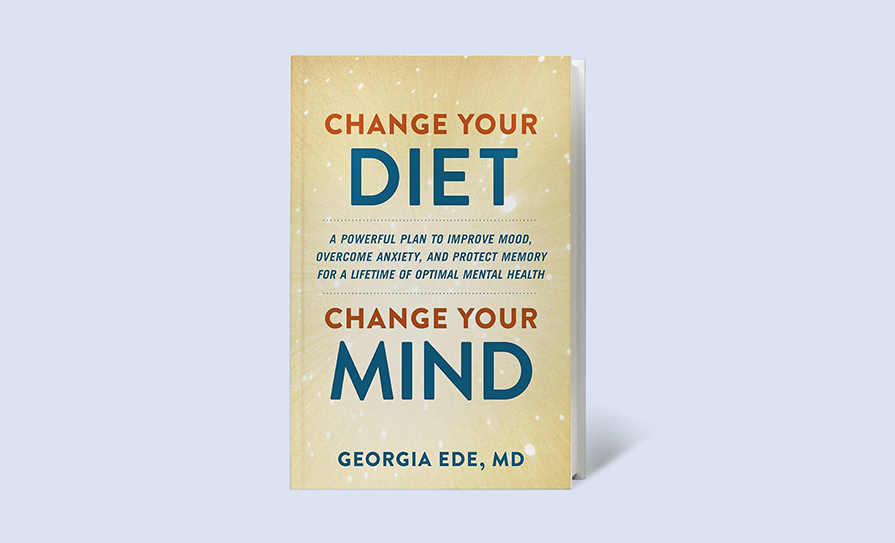
Title: Change Your Diet, Change Your Mind
Author: Dr Georgia Ede
Publisher: Yellow Kite
Reviewer: George Winter
“On the night of December 23, 2019, a sudden attack of agitation jolted Karl from a deep sleep.” This book’s cracker of an opening sentence comes not from a thriller writer, but “a Harvard-trained psychiatrist specialising in nutrition science, brain metabolism, and mental health”, and it demonstrates at the outset that Dr Georgia Ede favours reader engagement over academic detachment. This approach, allied to Dr Ede’s ear for speech and a sharp intellect, results in prose that renders a potentially complex field of study in plain, accessible English. Further, Ede’s evidence-based and fully referenced text reflects an author who, while ready to wield humour in the service of common sense, does not lose sight of her mission to make important points on the role of diet in mental health.
Ede explains in the introduction how health problems in early middle age prompted her to experiment with various dietary regimes; undertake nutritional research; discover “that nearly everything I thought I’d known about nutrition was wrong”; and learn “that there is absolutely no science (or logic) behind recommendations to eat plant-based diets, balanced diets, high-fibre diets, low-cholesterol diets, or diets containing whole grains, low-fat dairy products, or rainbows of fruit and vegetables”.
The 440-page book is in four parts: ‘Rethinking Brain Food’ (five chapters); ‘Our Descent into Dietary Madness’ (four chapters); ‘The Whole Truth about Whole Foods’ (six chapters); and ‘Hope is on the Menu’ (six chapters). Each chapter begins with an insightful quote, like this from writer and farmer Wendell Berry (born 1934): “People are fed by the food industry, which pays no attention to health and are healed by the health industry, which pays no attention to food.”
Chapter 1 asks ‘What Causes Mental Health Problems?’. It reveals that while around half of those with depression benefit from standard antidepressants, some 40 per cent improve with placebo alone. And it’s no coincidence, notes Ede, that people with obesity, type 2 diabetes, and cardiovascular disease are prone to developing psychiatric disorders like depression, bipolar disorder, and schizophrenia; with inflammation, oxidative stress, and insulin resistance shared by these physical and mental health conditions. If one accepts, Ede argues, that diet is central to bodily health, why should the brain be excluded?
We are introduced to “metabolic psychiatry”, which has emerged in the last five years or so. First coined by Stanford University psychiatrist Dr Shebani Sethi, it is defined as “a new subspecialty focused on targeting and treating metabolic dysfunction to improve mental health outcomes”. Interestingly, the original intended purpose of ketogenic diets – very-low-carbohydrate, moderate protein, high-fat diets that stimulate the body to burn fat – was to stabilise brain chemistry and was devised in 1921 to treat children with epilepsy. And Ede further explains the biochemical basis behind the role of ketones in brain metabolism and the crucial part played by mitochondria in marshalling the metabolic traffic. Citing the strong evidence-base for the promise shown by the ketogenic diet in neurological conditions like multiple sclerosis, Parkinson’s disease, and migraine headaches, Ede expresses optimism for this diet in psychiatry since “the line between neurology and psychiatry is imaginary”. Ede further makes the important points that the brain is not divided into neurology cells and psychiatry cells; that “[i]t stands to reason that if a particular treatment benefits neurological brain disorders, it should also benefit psychiatric brain disorders”; and that psychiatric conditions are neurological conditions – it’s just that their symptoms were historically deemed more psychological than biological.
A chapter on ‘The Promise of Ketogenic Diets for Mental Health’ notes that the first study describing how a ketogenic diet could treat mental illness was published in 1965 by clinicians at the Central Louisiana State Hospital, US, who placed 10 women undergoing treatment for schizophrenia on a fortnight-long ketogenic diet and reported significant improvement. After a 44-year hiatus, a 2009 case report was followed by a further five case reports, and three clinical trials of ketogenic diets for schizophrenia are currently underway in the US and Australia.
Many of bipolar disorder’s underlying features are shared with epilepsy, and if epileptic seizures can be stabilised by a ketogenic diet, asserts Ede, it may also stabilise mood swings in those with bipolar disorder. Trials have been proceeding apace and by the time this review is published the peer-reviewed results of a study undertaken at the University of Edinburgh, UK, by a team investigating the role of a ketogenic diet in bipolar disorder should be available. And it is significant that a world-leading researcher in this area – Dr Iain Campbell, Baszucki Research Fellow in Metabolic Psychiatry at the University of Edinburgh’s Centre for Clinical Brain Sciences – explains in chapter 9 how a ketogenic diet has put his bipolar 2 disorder into remission for over seven years.
With chapters on ‘Meat: The Original “Superfood”’ and ‘Why Most Nutrition Guidelines are Wrong’ it is emblematic of Ede’s common-sense approach that she cites Wales-based nutrition researcher Dr Zoë Harcombe, who told the UK Parliament in 2019: “Don’t base guidelines on the one macronutrient [carbohydrate] that we don’t need and that diabetics can’t handle.” But given the powerful metabolic nature of ketogenic interventions, Ede devotes a chapter to highlight possible caveats and pitfalls, and the need for “both medical and psychiatric supervision while transitioning to a ketogenic diet…”.
The field of metabolic psychiatry holds great promise and this book will be in the vanguard of publications that will help shape this fast-evolving discipline.
And what happened to Karl? You’ll need to read the book to find out.





Leave a Reply
You must be logged in to post a comment.